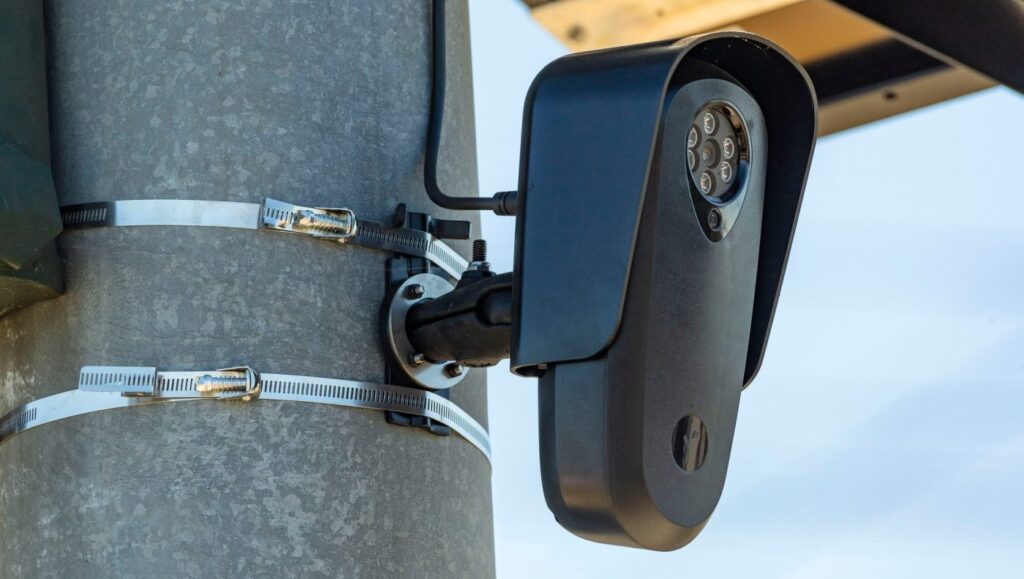
Los Alamitos is the latest community to become part of an automated, 24-hour surveillance network capable of tracking vehicles across Orange County, with the recent placement of license plate readers throughout the city.
The devices began going up on Feb. 2, Los Alamitos Police Capt. Wayne Byerley said. A total of 12 plate readers have been mounted along major thoroughfares leading in and out of town.
Plate readers excel at identifying stolen vehicles, Orange County Sheriff’s Sgt. Ryan Anderson said. The installation of the devices in Los Alamitos, which saw 16 motor vehicle thefts along with a relatively low crime rate in 2019, underscores how prevalent the technology has become throughout Southern California and beyond.
“They track things we might not even know we need yet,” Anderson said.
But the devices trouble others, like American Civil Liberties Union Attorney Mohammad Tajsar, who calls the readers “an integral part in a growing surveillance architecture” that could have unintended consequences.
The high-tech equipment identifies and logs the license plate number of every vehicle that passes by. It can be mounted on stoplights, traffic signs and vehicles. Plate readers are fully automated, function 24-hours-a-day and can instantly notify law enforcement whenever one spots a car sought by authorities.
Police in Los Alamitos hope their new plate readers will assist officers in combating a recent increase in catalytic converter thefts and help look for vehicles of people reported missing, Byerley said.
The readers were leased from Flock Safety as part of a 1-year pilot program. The deal was unanimously approved by the city council in June and will cost a total of $33,000 in public funds.
Flock Safety currently has nine contracts with law enforcement agencies in Orange County, company spokeswoman Holly Beilin said. And it’s not the only company supplying police departments with high-tech surveillance equipment.
In Lake Forest, with a population more than seven times larger than Los Alamitos, license plate readers have been on the lookout since December of 2020. The high-speed cameras spotted 24 stolen vehicles in 2021, Anderson said. And within a two-week span in late January and early February, they helped deputies recover four stolen cars in the city and flagged another connected to a kidnapping that Sheriff’s officials said happened outside of Orange County.
In Fountain Valley, Police Det. Bryan Nguyen recalled how detectives used plate readers designed by another supplier of surveillance equipment, Vigilant Platforms, to profile the routine of a suspect in a narcotics investigation without arousing his suspicion. Automated surveillance helped officers find out where he was living, and also led them to additional locations to investigate.
“It’s a tool that really just helps us do the work we’ve always been doing,” Nguyen said. “We’ve always had the ability to run plates, and this just lets us do that faster.”
Critics of widespread surveillance technology acknowledge it can be a powerful investigative tool. But they argue that there isn’t enough evidence to say whether its advantages over traditional law enforcement methods are worth potentially compromising Americans’ right to privacy. Tajsar said he believes there’s little to guarantee that the information discreetly collected by a vast network of plate readers won’t somehow wind up being used against law-abiding people.
The Sheriff’s Department retains information logged by plate readers from Vigilant Platforms for up to one year. Access to it is closely monitored, and deputies must specify why they are requesting data from the system, according to the department’s policy.
In Los Alamitos and most other cities in contract with Flock, the data recorded by plate readers will be deleted after 30 days. Officials in Lake Forest pay an additional fee to retain the information for up to one year, because they believe it could be “invaluable” in future criminal investigations, City Manager Deborah Rose said.
Flock plate readers do not keep track of whoever might be inside a scanned vehicle.
“We do not include facial recognition, so there is no way to compare a person in the vehicle against a database,” Beilin said.
“There is no expectation of privacy on public roads,” she added, a position echoed by other surveillance companies and the law enforcement agencies using the equipment.
In a pair of landmark cases that reached the Supreme Court in 2012 and 2018, the Justices ruled that authorities must have a warrant to use GPS or cell phone tower data, respectively, to track people’s movements. Those two decisions indicate that the whereabouts of private citizens are not public information, and police are not entitled to it, Tajsar said.
The justices have not weighed in on license plate readers.
Related Articles
Racially charged comments by DA Todd Spitzer send OC legal community into furor
Police seek help finding man who brandished gun at Seal Beach shoe store
Laguna Niguel man, a community leader, died in small plane crash at Kansas airport
California man on flight from LA charged with assaulting flight attendant
Large crowd of Rams fans ordered to disperse from Downtown LA
